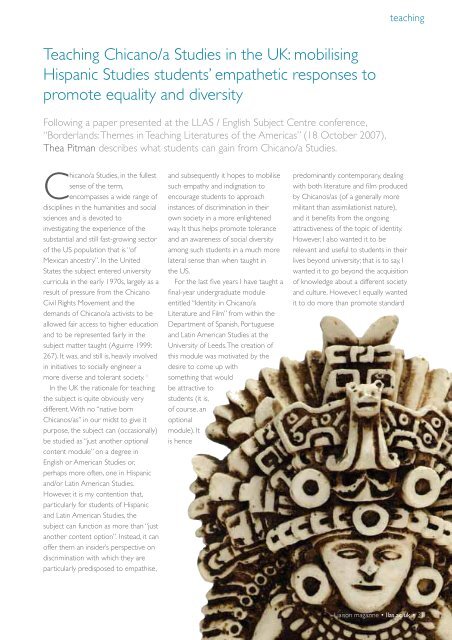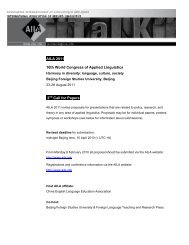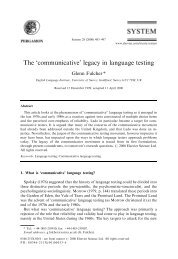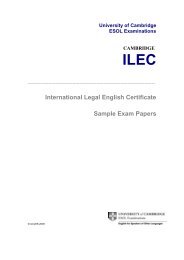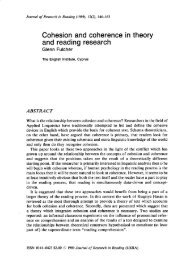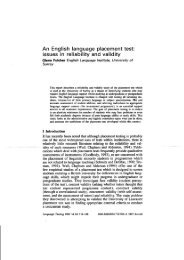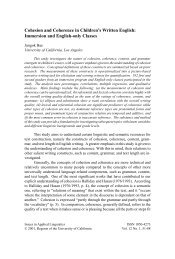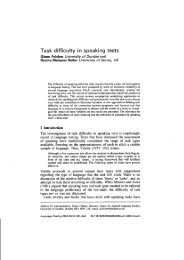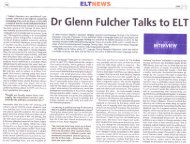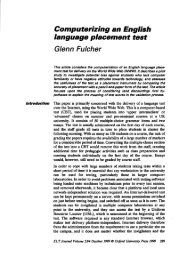Liaison Magazine - LLAS Centre for Languages, Linguistics and ...
Liaison Magazine - LLAS Centre for Languages, Linguistics and ...
Liaison Magazine - LLAS Centre for Languages, Linguistics and ...
Create successful ePaper yourself
Turn your PDF publications into a flip-book with our unique Google optimized e-Paper software.
teaching<br />
Teaching Chicano/a Studies in the UK: mobilising<br />
Hispanic Studies students’ empathetic responses to<br />
promote equality <strong>and</strong> diversity<br />
Following a paper presented at the <strong>LLAS</strong> / English Subject <strong>Centre</strong> conference,<br />
“Borderl<strong>and</strong>s:Themes in Teaching Literatures of the Americas” (18 October 2007),<br />
Thea Pitman describes what students can gain from Chicano/a Studies.<br />
Chicano/a Studies, in the fullest<br />
sense of the term,<br />
encompasses a wide range of<br />
disciplines in the humanities <strong>and</strong> social<br />
sciences <strong>and</strong> is devoted to<br />
investigating the experience of the<br />
substantial <strong>and</strong> still fast-growing sector<br />
of the US population that is “of<br />
Mexican ancestry”. In the United<br />
States the subject entered university<br />
curricula in the early 1970s, largely as a<br />
result of pressure from the Chicano<br />
Civil Rights Movement <strong>and</strong> the<br />
dem<strong>and</strong>s of Chicano/a activists to be<br />
allowed fair access to higher education<br />
<strong>and</strong> to be represented fairly in the<br />
subject matter taught (Aguirre 1999:<br />
267). It was, <strong>and</strong> still is, heavily involved<br />
in initiatives to socially engineer a<br />
more diverse <strong>and</strong> tolerant society. 1<br />
In the UK the rationale <strong>for</strong> teaching<br />
the subject is quite obviously very<br />
different.With no “native born<br />
Chicanos/as” in our midst to give it<br />
purpose, the subject can (occasionally)<br />
be studied as “just another optional<br />
content module” on a degree in<br />
English or American Studies or,<br />
perhaps more often, one in Hispanic<br />
<strong>and</strong>/or Latin American Studies.<br />
However, it is my contention that,<br />
particularly <strong>for</strong> students of Hispanic<br />
<strong>and</strong> Latin American Studies, the<br />
subject can function as more than “just<br />
another content option”. Instead, it can<br />
offer them an insider’s perspective on<br />
discrimination with which they are<br />
particularly predisposed to empathise,<br />
<strong>and</strong> subsequently it hopes to mobilise<br />
such empathy <strong>and</strong> indignation to<br />
encourage students to approach<br />
instances of discrimination in their<br />
own society in a more enlightened<br />
way. It thus helps promote tolerance<br />
<strong>and</strong> an awareness of social diversity<br />
among such students in a much more<br />
lateral sense than when taught in<br />
the US.<br />
For the last five years I have taught a<br />
final-year undergraduate module<br />
entitled “Identity in Chicano/a<br />
Literature <strong>and</strong> Film” from within the<br />
Department of Spanish, Portuguese<br />
<strong>and</strong> Latin American Studies at the<br />
University of Leeds.The creation of<br />
this module was motivated by the<br />
desire to come up with<br />
something that would<br />
be attractive to<br />
students (it is,<br />
of course, an<br />
optional<br />
module). It<br />
is hence<br />
predominantly contemporary, dealing<br />
with both literature <strong>and</strong> film produced<br />
by Chicanos/as (of a generally more<br />
militant than assimilationist nature),<br />
<strong>and</strong> it benefits from the ongoing<br />
attractiveness of the topic of identity.<br />
However, I also wanted it to be<br />
relevant <strong>and</strong> useful to students in their<br />
lives beyond university; that is to say, I<br />
wanted it to go beyond the acquisition<br />
of knowledge about a different society<br />
<strong>and</strong> culture. However, I equally wanted<br />
it to do more than promote st<strong>and</strong>ard<br />
<strong>Liaison</strong> magazine • llas.ac.uk •31


